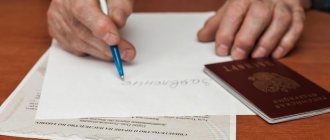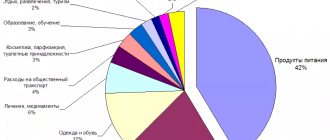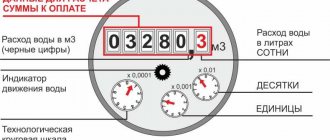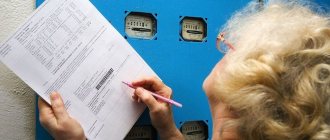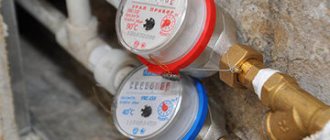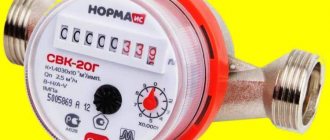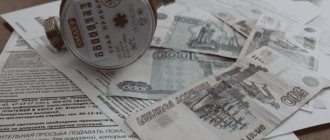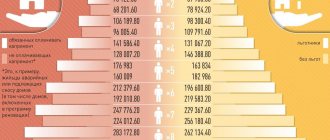How is the water fee determined?
Payment for water is a concept that includes not only the cost of the resource itself. It also consists of the costs spent on supplying and ensuring proper quality of water.
The final amount is also affected by the presence of in-house measuring devices at the consumer’s disposal. After they are installed, the fee is calculated by multiplying the readings by the tariff.
According to (hereinafter referred to as Resolution No. 354), the components of payment for water supply by meters can be distinguished:
- Payment for cold water supply (CWS) according to readings received from an individual meter.
- Payment for hot water supply (DHW) according to the readings of the apartment meter.
- Payment for sewerage services according to the apartment meter.
- Share payment in cold water costs spent on general house needs.
- Share of DHW costs for general household needs.
- Share payment in the structure of costs for sanitation services for the needs of an apartment building.
Find out more about what HVS and ODN are on the receipt.
Apartment buildings have common metering devices that measure the water consumption of the entire building. If you subtract the amount of individual apartment expenses from the total expense, the costs for general household needs (CHN) will become clear. They reflect the excessive consumption of water, associated both with good purposes, such as watering the local area, and with poor organization of water supply: leaks in risers and the like.
Read more about sewerage for general house needs in 2021.
Legal basis
Section 7 of the Russian Federation (hereinafter referred to as the Housing Code of the Russian Federation) is devoted to payment for utility services. In Part 2 of Art. 157 of the Housing Code specifies that water supply fees are calculated in accordance with the tariffs established by the region. Basic concepts in the field of water supply and sanitation are regulated.
The key link in regulation is the Rules for the provision of utility services to owners and users of premises in apartment buildings and residential buildings (Resolution No. 354). They establish the rights and obligations of the consumer and the seller, and provide a scheme for recalculating the amount of water charges.
Hot water is not up to standard
Hot water is one of the most expensive utility resources. Its payment accounts for a significant share of all housing and communal services expenses, but the quality of the service is not always good. If red-colored water flows from the faucet, its temperature is slightly higher than room temperature, and sometimes there is simply no water for a long time, then the owner has the right to demand a recalculation.
According to sanitary standards, the temperature of hot water cannot be lower than 65°C. The “Rules for the Provision of Utilities” contain requirements for temperature fluctuations during the day: no more than 3-5°C. For water with a temperature below 40°C, the consumer pays as if it were cold.
If it simply does not reach the standard, then the fee is reduced by 0.1% per hour for every 3°C below 65°C.
An owner who is not satisfied with the quality of the water supply service provided has the right to draw up and submit a claim to the management company. Paragraph 104 of the “Rules” states that upon receipt of an application, an inspection is carried out within two hours.
The period can be changed by agreement of the parties. A special commission draws up an act on site, one copy of which remains with the resident.
Residents who have been refused by the Criminal Code to verify the specified information have the right to draw up an act on their own. Based on this, the management organization will be fined in the future.
The fact of supplying hot water at insufficient temperature, confirmed by the act, is the basis for recalculation. An application for it is submitted to the resource provider. It also indicates the period of poor quality service. It is determined in accordance with paragraph 112 of the RF PP No. 354.
The difference in payment for the service in favor of the client is not issued in cash, but remains in his personal account and will be credited against subsequent charges.
Watch the video. The procedure for recalculating utility bills:
Cases involving increased water charges
At the initiative of the supplier or management organization, the price of water may change upward in the following cases:
- Based on the results of checking the values of metering devices, periodically carried out by representatives of the supplier. Recalculation of readings after verification occurs quite often. If the tenant underestimates the readings, then the detection of a violation will be followed by charging for water according to the data taken by the inspector.
- If any irregularities are detected in the meter connection. In addition to the act requiring the removal of the connection, the resident will be charged an additional fee based on the volume of water that he could have consumed.
- If an external influence on the meter is detected: broken seals, damaged integrity. The recalculation is similar to the second basis.
Read more about who should check the water meters in the apartment.
Grounds for recalculation
Current legislation provides for the possibility of recalculating amounts for water and other utility resources.
If there are meters in the apartment, this is done for one of the following reasons:
- Based on the results of checking the metering devices in the apartment. If the readings provided by the homeowner to calculate payments do not correspond to those found during the inspection by representatives of the resource provider, a recalculation is made based on the inspection data. In this case, it is possible that the amount will either decrease (if the readings were submitted with an overestimation of volumes) or increase it (if the readings were underestimated).
- In case of violation of the rules for connecting the consumer to networks. In this case, recalculation for the service is made on the basis of an act of the commission that established the fact of an incorrect connection. In this case, the consumer is charged additional fees for the unaccounted resource (for water, this is done based on the throughput of the pipes) and is given an order to eliminate such a connection. If it is impossible to establish since when the incorrect connection has existed, additional fees will be charged for the three previous months (according to Article 354 of the Resolution, paragraph 62).
- In case of interference with the operation of meters. Frequent reasons for recalculation on this basis are the loss of seals, missed deadlines after calibration of meters, etc. Recalculation is done from the date of installation of seals and devices that allow recording unauthorized interference in the operation of meters, but no more than three months prior to that. in which interference with the operation of devices has been established.
- When providing services (including cold water, hot water) with interruptions exceeding the standard duration, or of inadequate quality (for example, low temperature hot water). At the same time, the person guilty of providing low-quality services or their absence is obliged to pay the consumer a fine (Part 4 of Article 157 of the RF Housing Code, Section 9 of Rules No. 354).
As follows from the above, the initiator of the recalculation can be both the consumer himself and representatives of utility services authorized to conduct inspections of the consumption of relevant resources.
Reasons for reducing water charges
The consumer has the right to put forward a demand for a reduction in water charges. The RF Housing Code and Resolution No. 354 identify the following grounds for downward recalculation:
- Temporary absence from housing. This is relevant for apartments without meters, as well as to explain the lack of submission of information on the meter.
- Provision of services of inadequate quality and/or their complete absence. If there is no water or cold water flows from a hot tap, you should act quickly.
A specialist must record the violation. To do this, you should contact the dispatch service. The dispatcher is obliged to accept the message, register and report its number.
According to the regulations contained in section 10 of Decree No. 354, the inspector must arrive within 2 hours from the moment of the call. During the inspection, he will assess the temperature and water pressure and draw up a final report.
The inspection report is confirmation of the validity of the recalculation requirements.
Let us remind you that recalculation can also be performed if a technical error is detected in the calculations. Typos and inaccuracies are common. The fact of their detection should be reported to the management organization.
Reporting incorrect readings
Incorrect information about the IPU readings that the citizen submitted to the Criminal Code is one of the main reasons for the discrepancy in the accrued fee and the actually consumed resource. Having noticed the fact of overpayment, the owner has the right to contact the management organization with a request for recalculation.
Proceed as follows:
- call the authorized employees of the resource provider in order to draw up a report and record in it the exact readings of the IPU as of today’s date;
- fill out an application for recalculation and attach an act to it. Submit the papers to the settlement department of the Criminal Code in accordance with the established procedure;
- next month, payments from the management organization will arrive with recalculated amounts for the resource consumed.
Please note! Recalculation for domestic hot water is carried out on the basis of RF Regulation No. 354 and clause 61 of the Rules. The main thing is that the IPU comply with accepted standards, have seals, and the fact of their installation is recorded in the Criminal Code. Only in this case their testimony is taken into account by resource supply organizations.
Rules for charging fees in the absence of submission and incorrect submission of data
If the apartment has a water meter, the tenant has the right to report its readings. But it is not always possible to use this right. And if you haven’t submitted your testimony for a long time, the water fee may increase.
The accrual rules are determined by clause 59 of Resolution No. 354. In clauses. “b” is fixed: if the data is not transferred, the fee for the first 3 months is calculated taking into account the average consumption for the previous six months. If the tenant has forgotten about the meters for more than 3 months, then the payment is made according to consumption standards (clause 60), but without a coefficient.
When resuming the submission of information, the consumer may think about whether they should recalculate the water bill if they have not submitted the information for more than 3 months. There is no recalculation for the previous period. According to paragraph 31 of the Resolution, the supplier is obliged to use readings from apartment meters only for the billing period for which they were taken.
If readings were also taken in June for April-May, only the water used in June will be paid for on the meter.
Many payers have a question about what to do if the readings were reported incorrectly: the figure was changed upward, the readings for hot and cold water were mixed up, and so on.
When contacting the supplier, the fee will be recalculated, and the overpaid money will become an advance payment for the following months. Another option: the tenant will be credited for the amount underpaid for services in the previous billing period. This scheme of action is also valid if the electricity meter readings were transmitted incorrectly.
Calculation according to the norm
This option is possible in several situations:
- The consumer did not inform the authorized services about the installation of water meters. As a result, the meters are not sealed, and, therefore, there is no information about the device in public utilities. To correct the situation, it is necessary to invite specialists for verification. In this case, recalculation is not provided.
- The meter is long overdue and has not been tested. To rectify the situation, employees of the management company are invited to the home to perform the necessary actions.
In the absence of data on consumption standards in the presence of metering devices, a citizen may be subject to liability in the form of a fine.
How to request a recalculation of water charges based on the meter
To receive a recalculation of water charges, you need to inform the service organization (MC, HOA, housing cooperative) or the service provider if the water supply agreement was concluded with him directly. The data from the payslip will help you understand where exactly to go.
Recalculation of water meter readings in 2021 is carried out upon written application. It is drawn up in free form, but requires the presence of mandatory information:
- Full name of the applicant.
- Residential address.
- Request for recalculation.
- His period.
- Reasons for carrying it out with supporting documents attached.
There are two ways to submit:
- send the application by registered mail with acknowledgment of delivery and a list of the contents, keeping the receipt and notification;
- Appear at the organization in person and register your application with the responsible person. You should take two copies of the application with you; the employee must put a registration number, date and signature on yours.
You have only 30 days to apply. Changes to the payslip will be visible next month.
It is also worth mentioning how to recalculate water meters if readings have not been submitted. Although the provisions of Resolution No. 354 do not provide for recalculation at the request of the tenant, in practice many management companies reduce the fee. In addition, after checking the meters, based on clause 61, the supplier will be obliged to recalculate based on actual consumption. In any case, it would not be superfluous to submit an application for recalculation.
What documents to prepare
To carry out recalculation, you need to provide documents. Their composition depends on the reasons for changing water payments. So, if you did not provide evidence due to temporary absence from your place of residence, you should prepare:
- Statement.
- A document confirming the fact of absence indicating the period: travel certificate, tickets, certificate of being treated in a hospital, and so on.
For recalculation related to low quality of services / lack thereof:
- Statement.
- Service verification report.
- The results of an expert opinion, for example, on the composition of water, other evidence.
What documents will be needed
Requiring the recalculation of charges for the utility service of hot water supply or hot water supply, the owner attaches the supporting papers.
Evidence of deviation of the quality of the provided CG from the standard is:
- certificate of verification of the IPU, certificate of verification of testimony;
- act of measuring the temperature of the hot water supply;
- an act indicating that the water is turned off;
- expert opinion on the quality of tap water.
As confirmation, the consumer can provide extracts from the application book kept by the management organization.
How to get water recalculation without a meter
If there is no metering device, there is still a chance to save money. But recalculation is available only if there is a confirmed lack of technical ability to install a meter (section 8 of Decree No. 354).
There are other features of recalculation:
- it is possible if the period of continuous absence of the consumer from housing exceeds 5 days;
- payment for sewerage is recalculated when recalculating the payment for hot water supply and hot water supply;
- the cost of water for ODN is not recalculated.
To reduce your payment you need:
- Write a statement indicating all absent residents, dates of departure and arrival, and reasons.
- Attach documents confirming your absence to your application.
- Submit an application to the service provider.
It is important to remember: if the tenant submits an application before departure, the recalculation will be made within 5 working days or no later than 30 days after the end of the period of absence.
The procedure for recalculating utilities
Adjustments to amounts accrued for utilities can be made:
- Based on a protocol or report of inspection/checking of metering devices;
- According to the consumer.
If the initiative is taken by a citizen-consumer of utilities, he must submit an application to the company providing the relevant services (heat supply or water utility). The application must be registered (make a note of acceptance on a copy of the application). If there are additional documents (inspection reports, quality reports, etc.), they are also attached to the application.
The application must be reviewed within no more than 5 working days. If the decision is positive, utility bills will be revised, and overpaid amounts will be offset against future payments (that is, in subsequent periods the consumer has the right to pay smaller amounts).
In case of refusal to recalculate, the citizen is left to decide what to do next: he has the right to apply at his own choice to Rospotrebnadzor (for the quality of services), the prosecutor's office or the court.
Where to complain if a recalculation is refused
It is the responsibility of the supplier and management organization to change the amount of payment for water supply services depending on the circumstances. If the management company refuses to recalculate water costs, you can find leverage.
First, you should receive a written refusal from the company. You can complain about this refusal to the prosecutor’s office and Rospotrebnadzor. An appeal, supported by a written refusal and a copy of the application for recalculation, will become a reason for verification. If the requirements are justified, a recalculation will be made.
If the instructions of the regulatory authorities do not find a response, there is another chance to restore justice - a trial. It will also help in compensation for moral damage. You can go to court without going through the supervisory authorities.
Read more about where to complain about the Management Company.
Time limits for consideration of a complaint
The law allows the State Property Committee 30 days to consider submitted complaints, regardless of their content. In some cases, an extension of the period is provided.
The procedure for considering complaints from citizens to the Civil Housing Inspectorate:
- within three days the employee registers a complaint;
- within 30 days it is considered, facts are checked, requests are made, etc. The period is extended if this is really necessary to study all the circumstances on the merits;
- the refusal is sent to the applicant in the case where the complaint is made with violations, or the essence of the appeal is beyond the competence of the State Property Committee;
- the response is sent to the applicant with the result of the verification.
The storage period for citizens' appeals in the housing inspection archive is 5 years.
